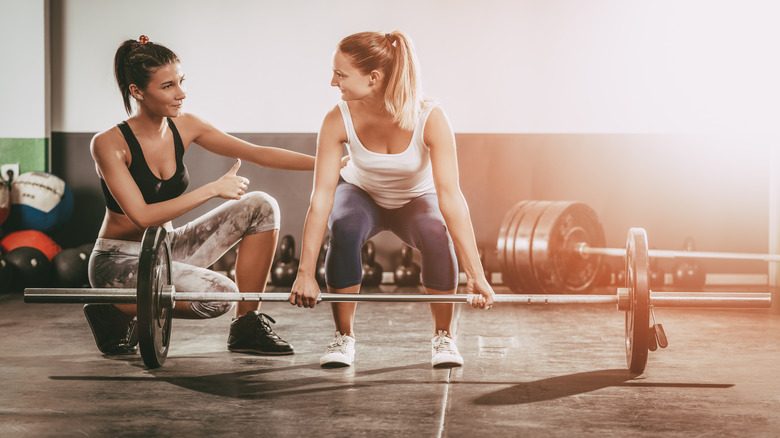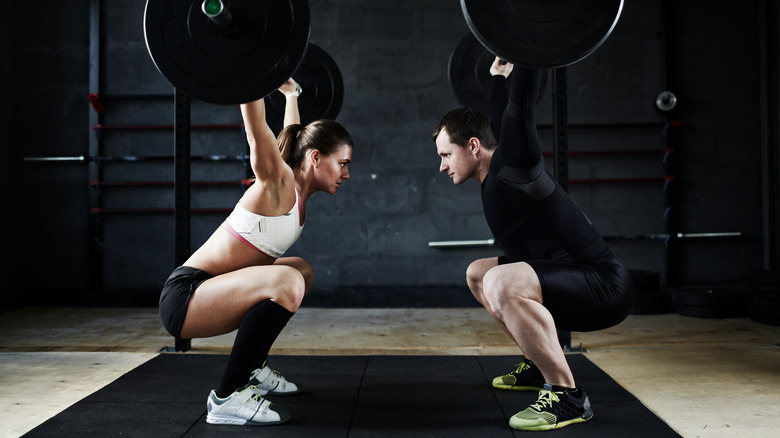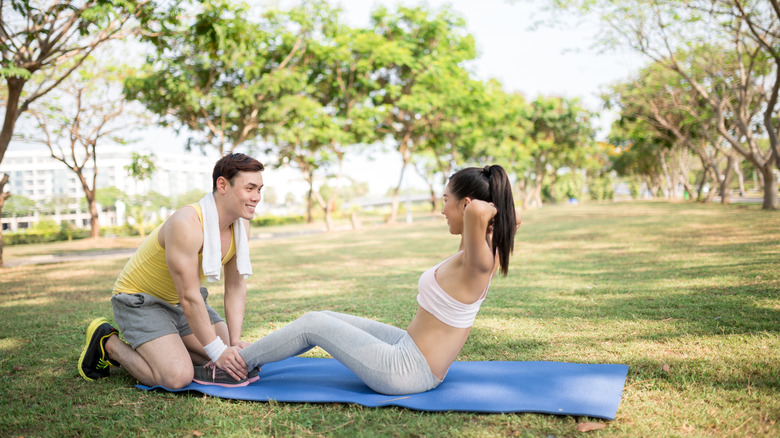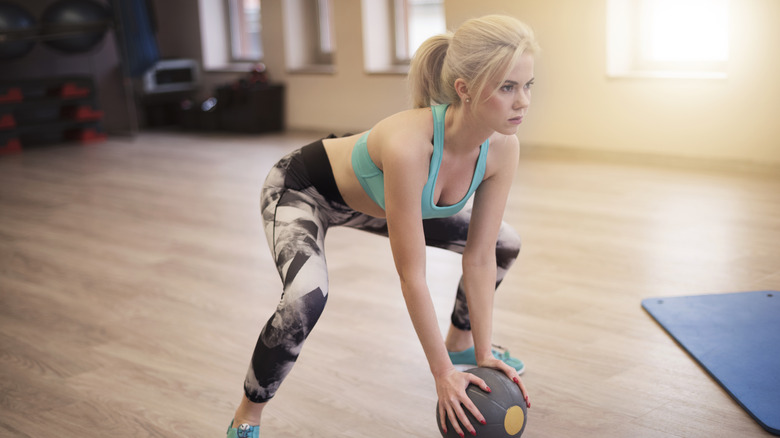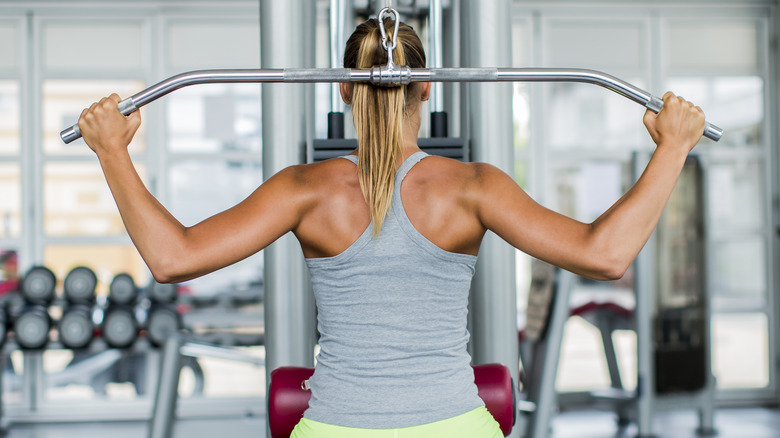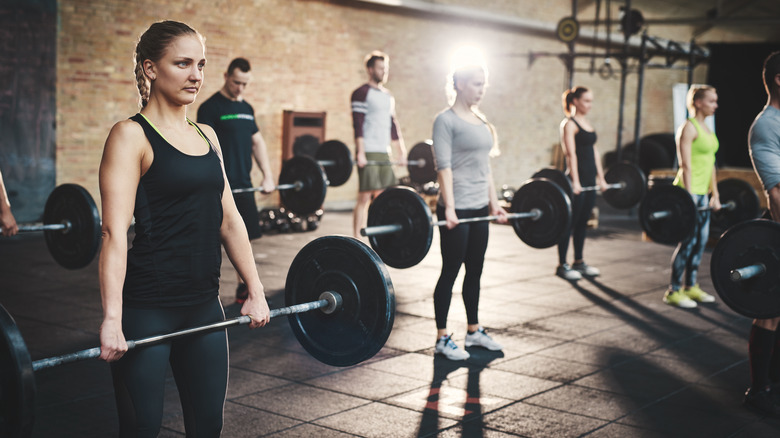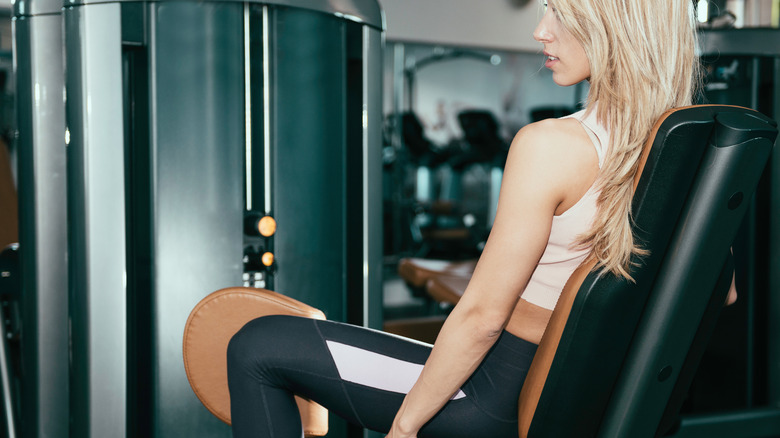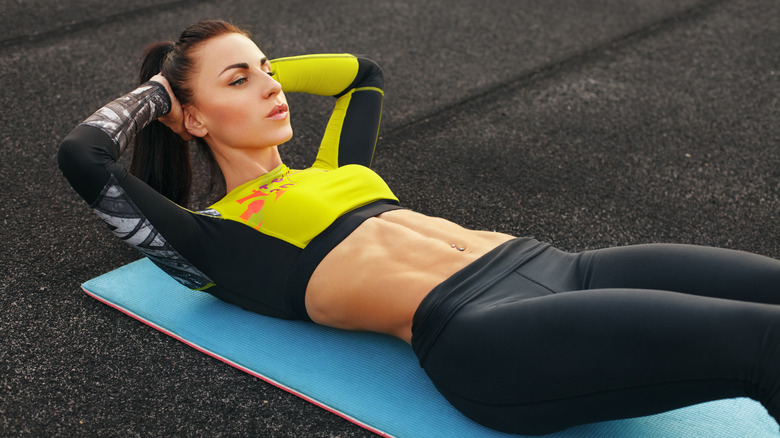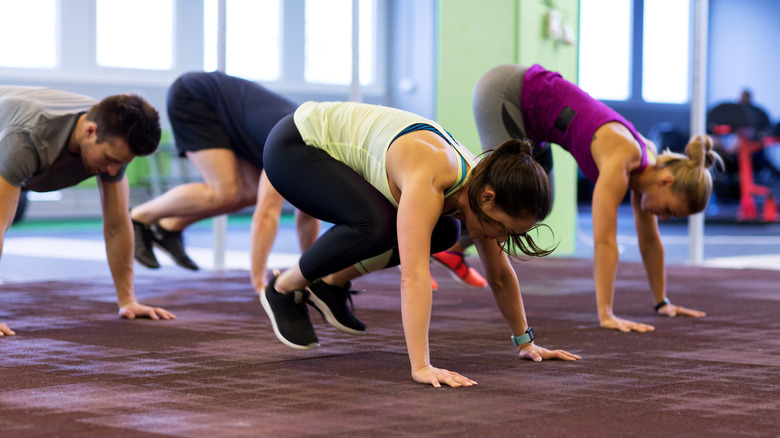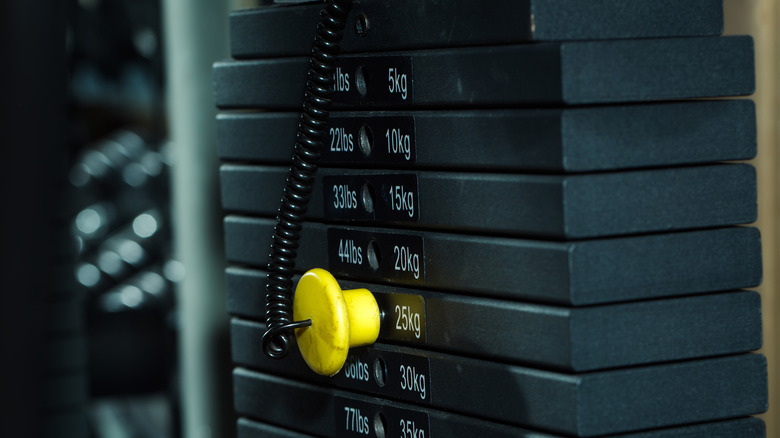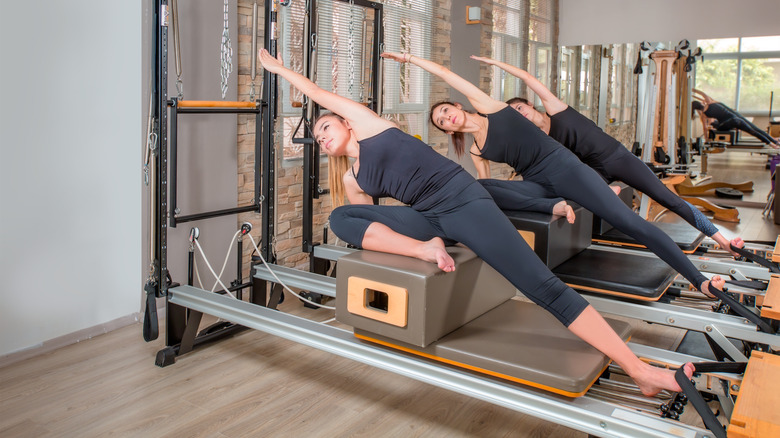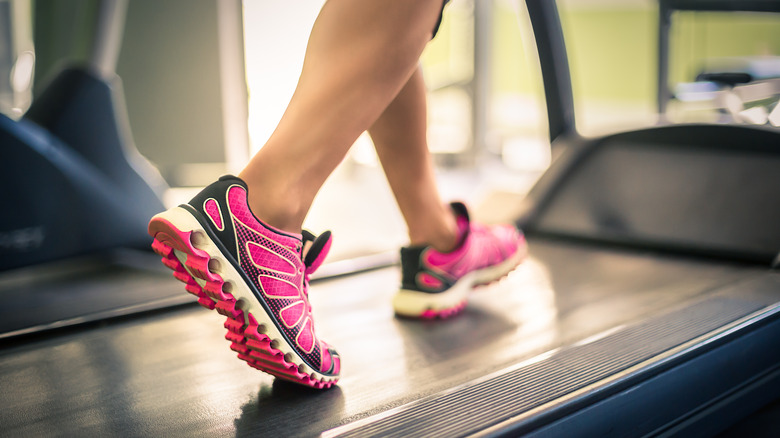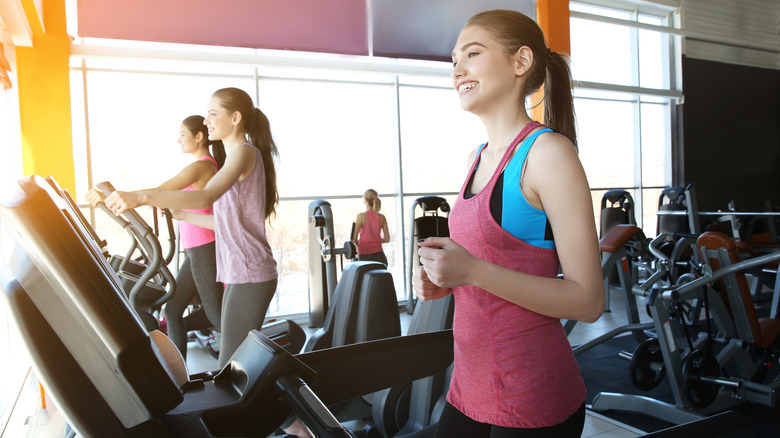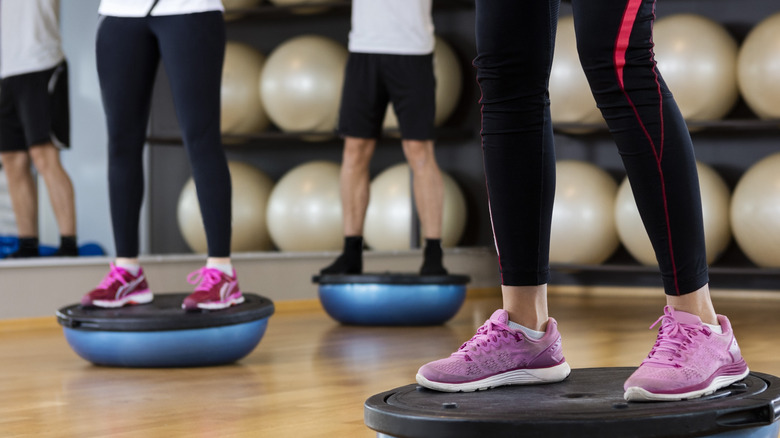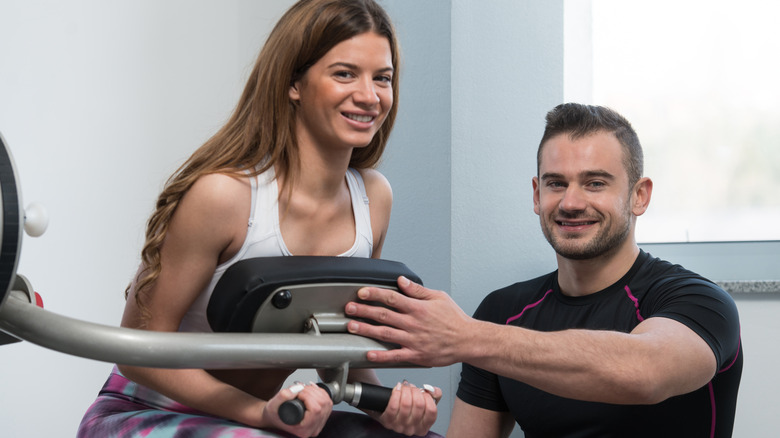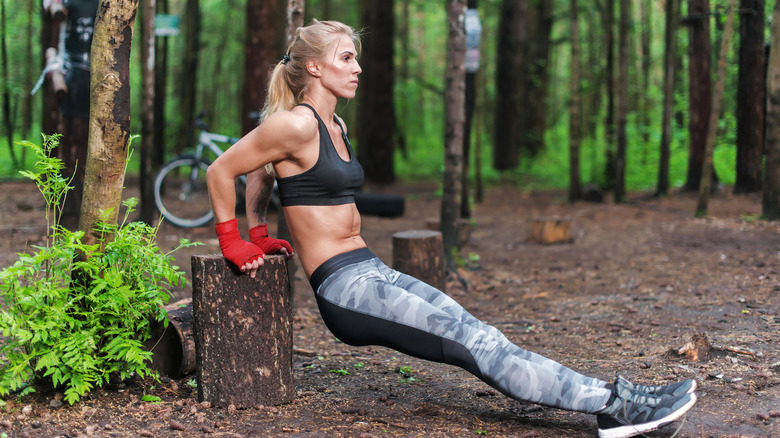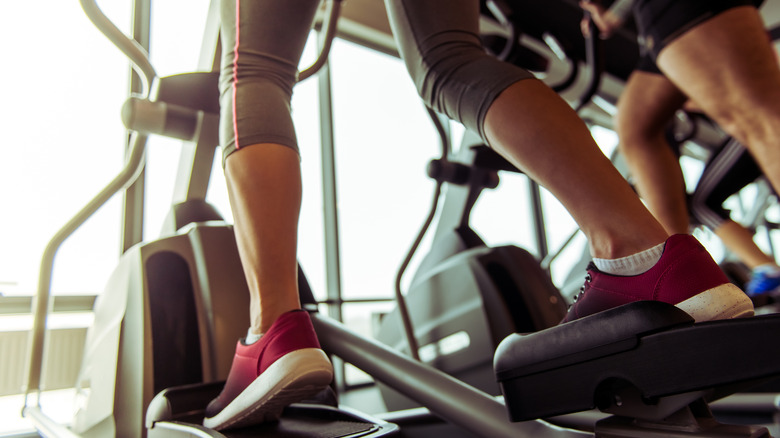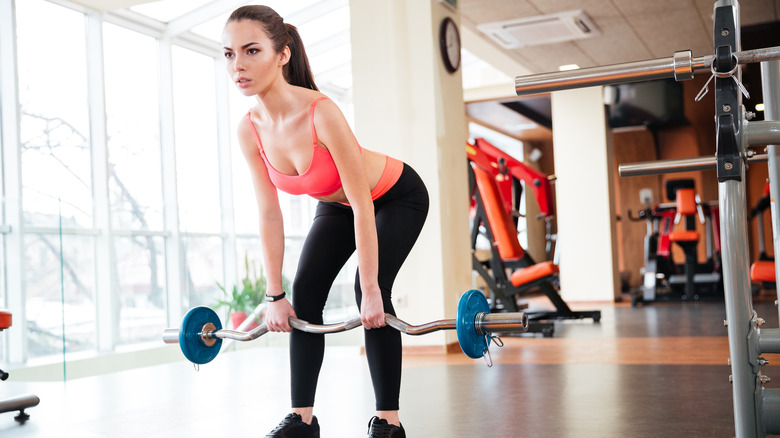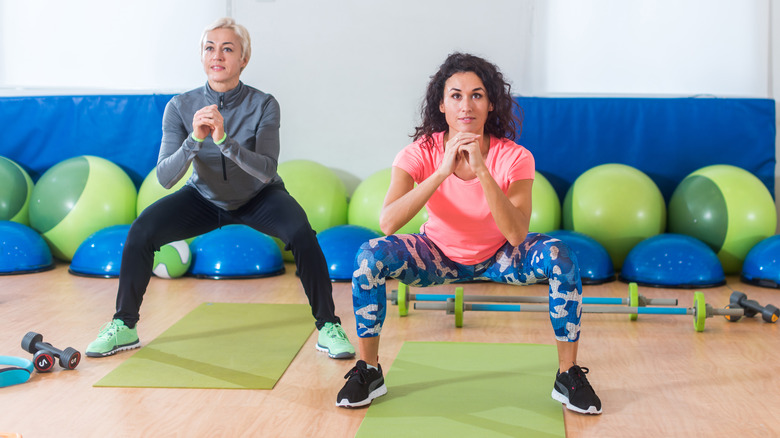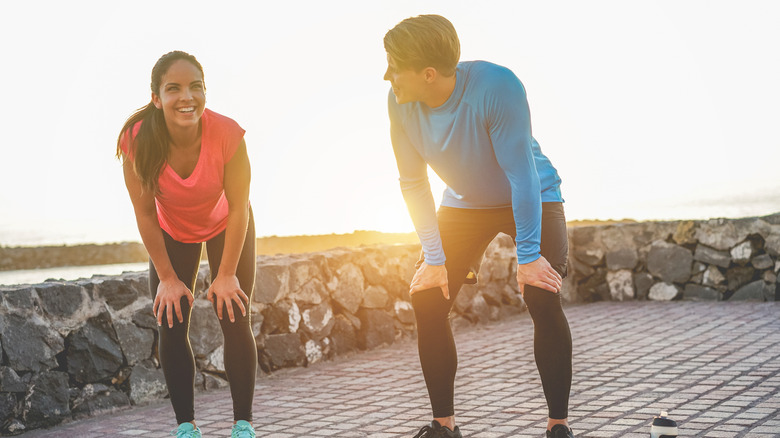Exercises Your Personal Trainer Hates
When it comes to staying in shape, most of us tend to have shiny object syndrome. I can't tell you how many times I've started an exercise routine, only to become distracted by the next big thing. Unfortunately for us, the next big thing could be ineffective or even dangerous. I had the chance to talk with personal trainers and exercise specialists to learn what exercises are worth it and which ones to skip. These are the exercises your personal trainer hates.
Overhead barbell squats
Lifting heavy barbells may help you look like a serious bodybuilder, but they could also put you at risk for injury. "Any exercises where you're putting the barbell over your head and bending at the waist have a lot of potential to cause unnecessary injuries," Certified Strength and Conditioning Specialist Tyler Spraul told me. "While these exercises aren't necessarily 'bad,' most of the general population lacks the skill and flexibility required to perform them correctly, which makes them susceptible to injury. There is a reason that people take years to learn these moves. They are tough!"
If you've got your heart set on the overhead squat, make sure your technique is correct before trying it. "Don't rush into movements like this and avoid loading up the bar with heavy weight, especially at the end of your workouts," recommended Spraul. "If you want to get into these moves, it is very important to get a qualified coach to give you guidance and instruction."
Spraul also told me that dumbbells and kettlebells can get you just as fit. "If you want to do similar moves, I'd recommend starting with dumbbells and kettlebells instead, because you can still train the same movements without the restrictions inherent in holding a barbell overhead," he told me. "There is a lot more room for error without the high risk of injury." If you're still not sure if you are using the equipment correctly, ask your gym about meeting with a personal trainer.
Full sit ups
If you want abs, sit-ups seem like a good place to start. However, just about every personal trainer I spoke with hated them. "People still seem to think that the best way to work the core is to do full sit ups, but actually, you can engage the core and do more effective moves in the plank position," personal trainer and creator of A Lady Goes West Ashley Pitt told me. "Rather than doing full sit-ups, in which you could hurt your back or strain your neck, try an elbow hover, or the 'stir the pot' move with your arms in elbow hover on a stability ball. It's a killer!" It turns out sit ups are just not that effective, so doing them every night is a waste of time.
"The abdominal muscles that sit ups are supposed to work are activated eccentrically. This means that they work when you are slowly stopping yourself from moving. The only part of a sit up that is actually working the muscles people use them for is when you've finished your sit up and are relaxing back to the ground," owner and lead trainer at Flagship Fitness Richard Wilcock told me. "Slowing that descend down would make it a more effective exercise. A better replacement exercise to work the abdominals would be a leg raise."
Woodchops
Sorry, I know you're disappointed to hear that woodchops aren't a great exercise, except wait, what are they? Woodchops involve swinging your arms across the body and using your core to stabilize.
"This across the body move is designed to work the core, but oftentimes people just hurt their backs by doing it improperly," explained Pitt. "You will usually see people holding a medicine ball and going diagonally across the body. A better way to work the cross-slings of the core is actually in plank position, by lifting opposite arm and leg at the same time and take them out to the diagonal. Way safer!"
Anything that puts stress on your shoulders
Whenever you're trying a new exercise, it's important to pay attention to how your body is feeling. If you notice pain, it's important to stop, rather than pushing through it. There are certain exercises that are more likely to cause pain in the shoulders, so it's crucial to avoid them.
"There are two popular exercises that make me wince every time I see them. They are seated press behind the neck and lat pulldowns behind the head," personal trainer, coach, and powerlifter Robert S. Herbst told me. "These are both very bad because they put too much torque on the shoulders and force the shoulders forward. This can lead to impingement and rotator cuff issues."
Any move that forces you to twist or rotate your shoulders too much is dangerous. "Better substitutes would be a press in front of the face, bringing the bar down to chin level or higher if that causes shoulder discomfort," Herbst said. "For lats, the person should bring the bar down in front of the face to the chin or lower, but again can cut it higher if there is discomfort."
Barbell upright rows
It seems that barbells couldn't get a break with these personal trainers. The risk for injury is higher, so most recommended changing up your equipment. "Barbell upright rows can cause rotator cuff issues including shoulder impingement," exercise physiologist, Bowflex Fitness Advisor, and author of Beat the Gym Tom Holland told me. "Do dumbbell front raises instead."
Abductor/adductor machines
In addition to safety, another factor the personal trainers kept in mind was effectiveness. Just because an exercise is safe does not mean it's worth it. Many of us like to focus on one or two trouble spots when we're working out. However, it's impossible to get rid of fat in just one area of the body, so don't spend too much time in one area.
Overdoing it on the leg machines is a common mistake among female exercisers. "Women generally use these machines in an attempt to spot-reduce fat deposits, which cannot be done," explained Holland. "Do walking side lunges with a resistance band instead."
Abdominal crunches
Just like sit ups, crunches are not the best ab workout and definitely will not leave you with a six pack. "Abdominal crunching is not nearly as effective as using your core as a stabilizer for the body. Crunches can exacerbate certain conditions like diastasis recti (abdominal separation) and are ineffective when the deep abdominal muscle, the transverse abdominis, is not properly engaged," said Kasey Shuler an ACSM certified personal trainer and writer.
"Instead of crunches, I recommend core exercises where the core is kept stable and the other limbs are extended to provide instability as resistance, such as planks, dead bugs, one-legged exercises, and exercises performed on an uneven ground outdoors or on a fitness tool like a BOSU ball."
Many of us assume that crunches are going to tone our stomachs, but they don't actually burn fat. "Ab workouts like crunches do not burn fat, and you're not going to be able to do enough of them in one sitting to burn enough calories for them to make a huge impact on weight loss," fitness trainer and author of Fat Burn Revolution Julia Buckley told me. "For your ab muscles to be seen the most important factor is fat loss, so that means changing your diet. To burn fat with exercise you need a varied fitness program including strength training and HIIT (high intensity interval training)."
Burpees
I'm not going to lie. I was pretty excited to hear that burpees can be dangerous. They are one of my least favorite workouts, and if you give one a try now, you'll see why.
"Burpees can be dangerous. The most common burpee mistakes are improper push-up form, sagging shoulder blades from a disengaged back and core from fatigue, and knees extending over the toes when jumping back to standing position," explained Shuler. "In exchange for burpees, I recommend get-ups for functionality. There is less chance for knee injury, and the movement is more natural, that is, this move is performed during one's day as a means to get off the floor more often than a man-made burpee. For a cardio burst, add five rounds of ten kettlebell swings." So unfortunately, these moves definitely don't look easier, but at least they're safer.
Weight machines
Many of the personal trainers I spoke with recommended steering clear of weight machines at the gym. These machines can end up doing some of the work for you, keeping your muscles from learning how to properly perform the move.
"Strength training machines can be helpful for beginners who don't know how to lift weights safely, but I would recommend instead that you learn the technique," Buckley told me. "The problem is that because they support you so much, you're not using as many muscles so although you might feel the burn in the one area you're working, the rest of your body might be completely at rest meaning you don't get all the benefits of firing up multiple muscles, and your whole body working as a single unit in the way you would using free weights like dumbbells, kettlebells and barbells."
Instead of going straight for the machines every time, wander around the free weights area.
Pilates
I always thought that Pilates was an amazing workout, but it turns out it doesn't do much for any muscles but your core. "Pilates is a good workout if you want to strengthen your core. However, a Pilates workout doesn't burn very many calories," warned Buckley. "The moves tend to be small and further spaced out, so you're not getting your heart rate up the same way you would if you were doing high-intensity interval training (HIIT). You can probably burn up to 400 calories in 30 minutes of Pilates, but that's it. It's just not the best use of your workout time if weight loss is your end goal."
Feel free to throw in a Pilates class here and there, but if you're trying to lose weight and don't have a ton of extra time to spend at the gym, go for more cardio and strength-training.
Long duration cardio
It's a great feeling to see all the calories you burned at the end of a long run on the treadmill. However, just doing cardio probably won't help you hit your weight loss goals. "Longer isn't always better. Running long distances and spending an hour on the elliptical are okay workouts for burning calories, but they're not great for fat-burning," explained Buckley. "Also, too much cardio can start to break down muscle, which is what you don't want. HIIT is much more effective for burning fat quickly, building muscle, and ultimately helping you lose weight."
Walking on the treadmill
There are some days when you get to the gym, and you just don't have it in you. You're exhausted or maybe feel like you're coming down with a cold, so decide to just take it easy and walk on the treadmill. I've certainly done that. However, try not to make a habit of it.
"A popular exercise that is not effective, and which many people partake in for fat burning, is long slow walks on the treadmill," personal trainer, fitness expert, and film and TV stuntwoman Andrea Kinsky told me. "Unfortunately this exercise will not bring about any desired results and is a waste of time."
If you've always been a treadmill walker, start by including some intervals. "I highly recommend doing intervals, altering either the incline of the treadmill or the speed. Start off with a warm up and stretch for at least five minutes to get the blood moving, and then do ten intervals of 30 seconds to one minute with one minute recovery," recommended Kinsky. "This is what will burn fat and tone at the same time. Not to mention, you will find this to be a much shorter workout which is what we all want, right?"
BOSU ball exercises
BOSU balls tend to be a favorite among personal trainers. It would be impossible to walk around your local gym and not trip over at least a few of them. So I was surprised to hear that not all personal trainers love them.
"I might take some flack for this, but most, if not all BOSU ball exercises are not effective," personal trainer James Shapiro told me. "The level of proprioception that some people believe that they can get by standing on it can be more safely achieved with other means necessary."
Abdominal machines
When it comes to abdominal exercises, personal trainers seem to prefer full body exercises that force your abdominal muscles to stabilize you, rather than workouts that focus solely on your abdomen.
"Abdominal-focused strength machines that focus on rotation are the most dangerous movement," explained Shapiro. "The movement requires focus and control, and yet I see gym goers go with heavy weight and use little control. Our obliques help control rotational movement but they should never be on the beating end of a heavy movement."
Instead, Shapiro recommends backing off on the weight used. "I would prefer a slow standing cable rotation using minimal weight," he said. "Standing compared to seated movements already uses more caloric expenditure and core activation. In addition the movement uses the hips more in the movement, something you don't get when you're kneeling on a machine."
Tricep dips
When it comes to arm exercises, we know that barbells are out, and now so are tricep dips. "The triceps dip is one of my most loathed exercises," blog editor and publisher of the National Federation of Professional Trainers Beverly Hosford told me. "It puts the shoulder joint into a vulnerable position that can cause injury if not right away, over the long term. It's meant to work chest and triceps."
Instead, focus on full body exercises that also target the triceps. "Planks, burpees, pushups, pullups, and triceps extensions are all other ways to get the same effect without the risk," said Hosford. "The only reason you should do dips is if you're going to be doing this movement for your job and need to train the body that way. Perhaps a cirque du soleil person might do them or someone in the military." So in other words, just skip them.
Elliptical machines
I have always liked elliptical machines, because they're easy, but it still feels like I'm accomplishing a workout. Unfortunately, that may not be the case.
"I just think they're useless. I don't think there's anything in the human body that was built to run like that," strength and conditioning coach for the Baltimore Orioles Joseph Hogarty told U.S News. If you're looking for a machine to work your muscles and protect your joints, Hogarty recommended trying a rowing machine. "It's an awesome piece of training equipment, whether it's for long distance endurance events, or shorter sprint-type events," he said.
Deadlifts
Deadlifts require you to bend over from a standing position to pick up weights or a barbell. They are supposed to be great for toning your backside, but put your low back at risk.
"You have to really perfect it before you load the system too much," strength and conditioning coach for the Denver Nuggets basketball team Steven Hess told U.S News. "Before any type of power move or explosive move, I always check my athletes' range, and we don't move on until they're strong in that range."
Squats for beginners
Squats seem like the perfect easy workout for beginners, but they have to be done perfectly to keep your joints safe. "Everything in your body needs to be in alignment, which is something a lot of clients have trouble with at first," NASM certified personal trainer Annie Malaythong told U.S News. "It's not that I dislike them, but I think you need to get a professional to teach you how to do them properly."
Even personal trainers hate good workouts
Personal trainers are passionate about health and wellness, so hate they any workout that is ineffective or dangerous. However, even when it comes to effective workouts, they can't stay impartial.
"I hate bear crawls," Balance Gym personal trainer Ben Wiedemer told the Washingtonian. "This is when you drop onto all fours with your hands directly under your shoulders, then rise up onto your feet and move forward or backward at a fast pace." Wiedemer shared that bear crawls were always his least favorite, and now he never does them.
"I still make my clients do them, of course, because it's a fantastic full-body movement," shared Wiedemer. Next time you're working out with your personal trainer, ask her what exercises she hates. Even fit personal trainers are human!

